(Bloomberg) -- The US Supreme Court’s ruling throwing out President Joe Biden’s student-loan relief plan will likely further dent consumer spending at a time when the main engine of the economy is already stalling.
The decision to overturn the forgiveness program, which would have canceled as much as $20,000 in student debt for certain federal borrowers, won’t have a major impact at the macroeconomic level by itself, according to economists. But it will add to the financial strain households are increasingly facing this year.
“For impacted borrowers, this is indeed a setback that will limit their capacity to spend, and at the margin could add to the headwinds confronting consumer spending,” said Tim Quinlan, a senior economist at Wells Fargo (NYSE:WFC).
The broader impact on the economy will come this summer, when more than 40 million Americans resume student-loan payments, following a three-year pause aimed at alleviating the weight of almost $1.8 trillion in student debt.
Morgan Stanley (NYSE:MS) economists anticipate 90% of the funding for those repayments will come from lower consumer spending instead of savings. They see personal consumption expenditures and overall gross domestic product ending the year about 0.1% lower than if student-loan payments remained frozen.
Even before Friday’s ruling, consumer spending had essentially stalled in recent months as Americans pulled back on purchases of goods. The weight of rising prices and worsening credit conditions is leading many households to tighten belts, with more consumers turning to credit cards to support spending.
Read More: US Consumers Lose Steam, Setting Economy Up for Sharp (OTC:SHCAY) Slowdown
The justices, voting 6-3 along ideological lines, sided with six Republican-led states that sued to challenge the program, on the grounds that it exceeds the president’s authority. It would have cost $400 billion over 30 years by one estimate.
‘Unthinkable’
Biden called the Supreme Court decision “unthinkable” on Twitter, adding that “this fight isn’t over.” He’s expected to announce new steps to protect student-loan borrowers in an address to the nation later Friday.
Student loan payments were paused in March 2020 as part of President Donald Trump’s bid to stem the economic damage from the coronavirus pandemic. The moratorium has since been extended multiple times, and expires Aug. 29.
The average monthly student loan payment prior to the pandemic was $393, according to the Federal Reserve. Collectively, those payments translate to about 0.6% of personal income and 0.8% of monthly personal consumption expenditures, according to Thomas Simons, an economist at Jefferies.
That’s similar to the magnitude of the tax increases associated with the 2013 fiscal cliff, “which was followed by a noticeable slowdown in consumption,” Simons said in a note earlier this year.
What Bloomberg Economics Says...
“The Supreme Court’s decision to toss out President Biden’s student debt relief plan will subtract from already cooling household spending power and so also lower inflation. Based on analysis from last year, when the plan was announced, we expect a 0.2 percentage-point drag on headline CPI over the next year, relative to the level that would have prevailed had the Biden plan gone into effect.”
— Anna Wong, economist
To read the full note, click here
Student loan payments are increasingly on the minds of investors, and the topic came up on several recent earnings calls and in interviews with company executives.
“We are closely watching emerging challenges to consumer spending and sentiment, such as the end of fiscal stimulus and the resumption of student loan payments,” Walgreens Chief Executive Officer Rosalind Brewer said on the company’s June 27 earnings call.
The decision to cancel the student-debt forgiveness program is “bad news for retail,” according to Neil Saunders, managing director at consulting firm GlobalData.
“The student loan forgiveness program and the pause on repayments have provided a very nice fillip to the retail sector and have helped boost growth during some challenging times,” Saunders said in an emailed statement. “Now that both policies are on the way out, the sector will feel something of a chill and this will start to hit just before the holiday season gears up.”
While debt-strapped households will be affected, the majority of borrowers with outstanding loans do not owe large amounts, Wells Fargo economists said Monday in a note. As of the first quarter, more than half had loans of $20,000 or less and only 7%, or about 3 million borrowers, owed $100,000 or more, the bank said.
“This will be a moderate headwind for consumer spending rather than a backbreaking event macroeconomically,” Tobin Marcus, Evercore ISI’s senior US policy and politics strategist, wrote Friday in a note following the Supreme Court decision.
